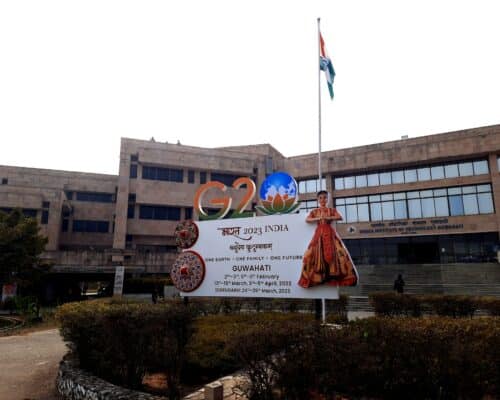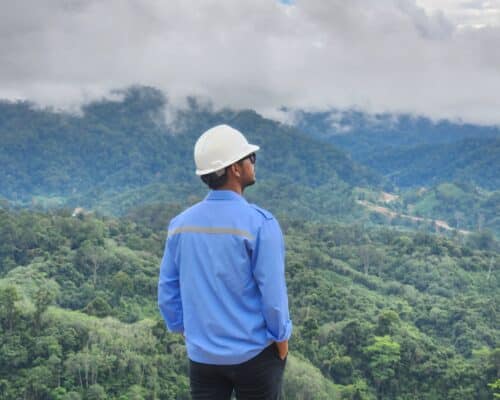Asia’s Progress On Global Renewables and Energy Efficiency Pledge
Source: BRINK
05 May 2025 – by Eric Koons
Tripling Renewable Energy and Doubling Energy Efficiency
At COP28, nearly 120 countries endorsed the Global Renewables and Energy Efficiency Pledge, committing to triple global renewable energy capacity and double energy efficiency improvements by 2030. This is just one of several commitments countries have made to reduce their greenhouse gas emissions. While these types of pledges are environmental in nature, they also carry significant economic implications. This is particularly true for Asia, where many nations are heavily reliant on fossil fuels and simultaneously at risk from climate-induced economic disruptions.
The latest report from Climate Analytics evaluates how eight Asian countries critical for the region’s energy transition are progressing towards these international climate pledges. The findings are clear: while ambitions are high, progress remains inconsistent and failure to act could undermine environmental and economic stability.
Primary COP Pledges and Their Significance
Several climate agreements have become central to Asia’s energy transition.
- The Global Coal to Clean Power Transition Statement (COP26) aims to phase out unabated coal, cease new coal plant construction and boost clean energy investment.
- The Global Renewables and Energy Efficiency Pledge (COP28) focuses on tripling renewables and doubling energy efficiency from 2022 levels by 2030.
- The Global Methane Pledge (COP26) commits signatories to a 30% reduction in methane emissions from 2020 levels by 2030.
In addition, the Energy Transition Council (COP26) was established to support developing and emerging economies in making clean power affordable, reliable and accessible. It fosters international cooperation to provide technical assistance, investment frameworks and political dialogue to remove barriers to clean energy deployment.
Together, these pledges aim to drive the energy transition and create economic opportunities, such as reduced fossil fuel imports, new clean energy jobs and foreign investment via Just Energy Transition Partnerships (JETPs) in countries like Indonesia and Vietnam. However, as the Climate Analytics report highlights, the success of these pledges depends heavily on their full integration into national policies and updated NDCs.
Progress and Challenges in Asia’s Renewable Transition
Across Asia, countries are making uneven progress in meeting the goals of these key climate agreements. While some have demonstrated ambition, systemic barriers, policy volatility and financial constraints hinder regional alignment with climate targets.
Tripling World’s Green Energy Capacity
The region has seen significant growth in renewable energy, more than doubling its installed capacity since 2015. However, to achieve the Global Renewables and Energy Efficiency Pledge, the target countries must increase their capacity by is 16% annually from 2023 to 2030. In the first year, the average increase was less than 6%. So far, progress has been intermittent, making it fragile and often hindered by regulatory issues and grid limitations.
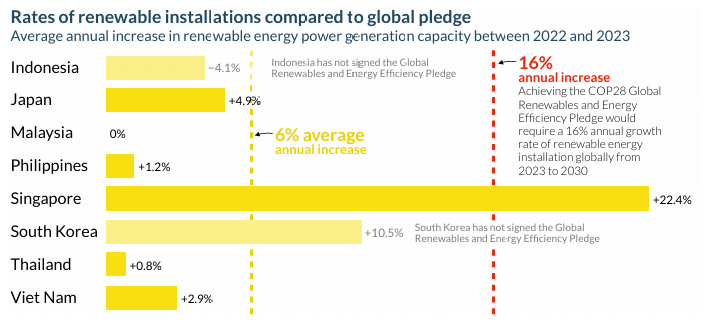
For example, Vietnam was a shining solar success story between 2018 and 2020, when solar capacity increased from 100 MW to 16.7 GW. However, in 2019 and 2020, Vietnam changed its feed-in-tariff scheme and dropped support for large-scale PV installations. As a result, the boom faltered, stalling new solar investments.
Persistent Coal Dependence
Coal-fired power plants operational capacity has increased since 2015, yet the pipeline for future development is slowly down. In 2015, the target countries had 153 GW of coal power in the development pipeline, and by 2023, this had dropped to 30 GW. This is a promising sign and results from a mix of increasing cost competitiveness of renewables and policy shifts away from coal.
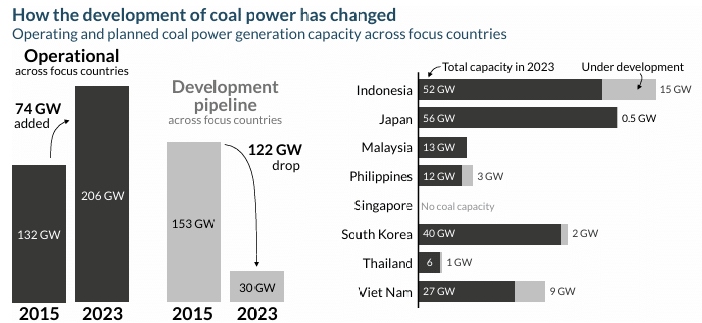
That being said, coal power plants typically have an operational lifetime of over 40 years, which means facilities constructed now will still be operational in 2050. Coal power is incompatible with the Paris Agreement, so countries must retire these plants early or not align with their climate commitments. Furthermore, this continued investment in coal poses long-term economic risks, including stranded assets and higher exposure to international carbon pricing mechanisms.
Limited Prioritisation of Energy Efficiency
Across the region, energy efficiency is underleveraged. While Japan and Indonesia have achieved the 4% annual energy intensity reduction required by the global pledge, these gains may be due more to external economic factors or mild weather than structural policy improvements.
In contrast, Thailand and the Philippines struggle with fragmented policies and limited enforcement, missing critical opportunities to cut emissions, lower industrial costs and improve energy reliability. Energy efficiency progress will remain piecemeal and economically insufficient without a strong regulatory framework.
Uneven Methane Emission Reductions
Methane reduction efforts vary widely across Asia, with only a few countries showing sustained progress. Japan and Vietnam have incorporated the Global Methane Pledge into their climate policies, resulting in measurable emission reductions since 2020. Meanwhile, methane emissions have increased in Indonesia and the Philippines, mainly due to coal mining and ineffective waste management. These emissions threaten climate goals and risk future trade restrictions and missed financing opportunities tied to methane performance.
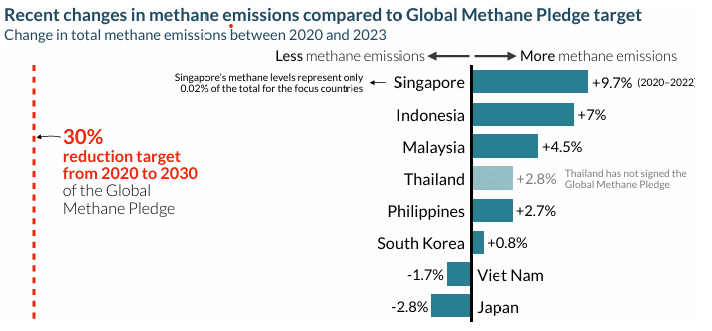
Growth in Natural Gas Dependency
Many Asian countries are investing heavily in natural gas infrastructure, viewing it as a transitional fuel, but this approach may backfire. Countries like Vietnam, the Philippines and Singapore are scaling up LNG imports with projects that could lock in decades of fossil fuel reliance. This strategy threatens to divert resources away from renewables, lead to stranded assets and expose nations to global LNG price volatility. A more balanced transition strategy would prioritise energy diversification and investment in clean alternatives like battery storage and smart grids.
Economic Benefits of Achieving Climate Goals
If Asian nations fulfil the goals outlined in the global renewable energy efficiency pledge, the economic rewards will be substantial and far-reaching. Clean energy sectors are already major job creators. The global renewable energy workforce reached 13.7 million in 2022, and this could rise to 38 million by 2030 with accelerated investment.
Countries that meet energy efficiency and renewable targets will also see lower long-term power costs and greater macroeconomic stability. For example, Vietnam’s JETP aims to reduce power sector emissions to 170 MtCO₂e by 2030, down from a business-as-usual projection of over 250 MtCO₂e, potentially saving billions in climate-related damages. These benefits multiply when renewable projects are paired with modernised grids and local manufacturing, driving down energy prices, reducing import dependency and boosting domestic innovation.
Moreover, greater participation in global climate finance mechanisms will be possible. Countries like Indonesia and Vietnam are already benefiting from donor support through JETPs, enabling them to attract international capital and technical expertise. Nations that fail to implement the pledges risk losing access to these funds and falling behind in the clean energy economy.
Seizing the Economic Opportunity of Climate Action
The global renewable energy efficiency pledge is not just a diplomatic milestone; it’s a call to action for Asia to align its energy future with economic resilience. While regional efforts are underway, much more is needed to integrate these pledges into enforceable national frameworks.
Without decisive action, Asia risks being locked into a costly, carbon-intensive future, missing out on the enormous economic potential of the clean energy transition. As countries prepare their next nationally determined contributions, 2025 offers a pivotal moment to turn voluntary pledges into real policy, real investment and real progress.
by Eric Koons
Eric is a passionate environmental advocate that believes renewable energy is a key piece in meeting the world’s growing energy demands. He received an environmental science degree from the University of California and has worked to promote environmentally and socially sustainable practices since. Eric’s expertise extends across the environmental field, yet he maintains a strong focus on renewable energy. His work has been featured by leading environmental organizations, such as World Resources Institute and Hitachi ABB Power Grids.
Read more



